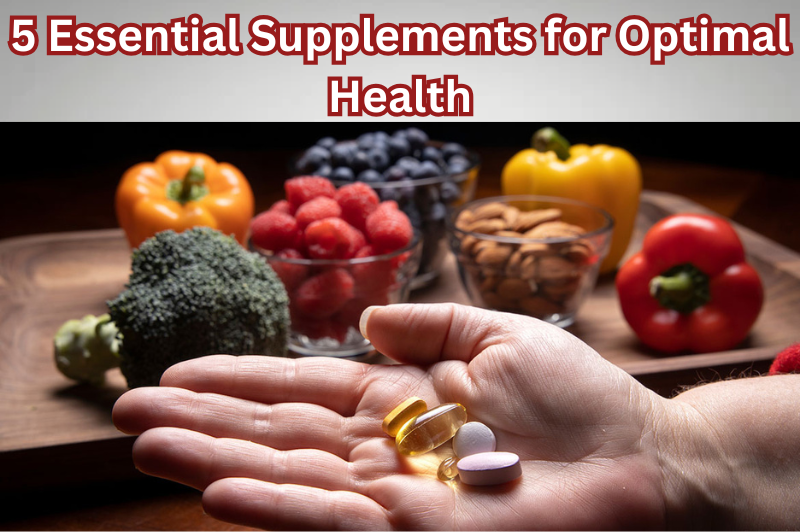
Table of Contents
1. Introduction
In today’s fast-paced world, ensuring we get all the necessary nutrients can be challenging. Essential supplements for optimal health can help fill the gaps in our diets, providing vital nutrients that may be lacking in our everyday food. This blog explores the top essential supplements for optimal health and their benefits, helping you make informed choices for your well-being.
2. Why Supplements Matter
Despite our best efforts, it can be challenging to get all the necessary nutrients through diet alone. Factors such as age, lifestyle, stress levels, and even geographical location can affect nutrient absorption and availability. Supplements provide a convenient way to ensure you’re getting the essential vitamins and minerals your body requires to function optimally. They can help fill nutritional gaps, support specific health goals, and improve overall health.
3. Key Supplements for Optimal Health
3.1. Omega-3 Fatty Acids
Omega-3 fatty acids are essential fats that our bodies cannot produce on their own, making them one of the most important essential supplements for optimal health. They play a crucial role in heart health, cognitive function, and reducing inflammation. Rich sources of omega-3s include fatty fish, flaxseeds, and walnuts. For those following a vegetarian or vegan lifestyle, algae-based supplements are an excellent alternative. For more information, check out our detailed post on Omega-3 Fatty Acids: Benefits and Sources.”
3.2. Vitamin D
Vitamin D is another essential supplement for optimal health, as it helps maintain strong bones, supports immune function, and plays a role in mood regulation. Many people are deficient in this vitamin, especially those who spend limited time outdoors. To boost your vitamin D levels, consider supplementation, especially during the winter months or if you live in areas with less sunlight. For more details on vitamin D, visit the NIH Vitamin D Fact Sheet.
3.3. Probiotics
Probiotics are beneficial bacteria that promote gut health, making them essential supplements for optimal health. They help balance the gut microbiome, which can improve digestion and boost the immune system. Probiotics are found in fermented foods like yogurt, kefir, sauerkraut, and kimchi, as well as in supplement form.
3.4. Magnesium
Magnesium is a vital mineral that supports over 300 biochemical reactions in the body, including energy production, muscle function, and nerve transmission. Incorporating magnesium supplements can help those who are deficient in this mineral, contributing to overall optimal health.
3.5. Multivitamins
Multivitamins are a convenient way to ensure you’re getting a broad spectrum of essential nutrients. They are especially beneficial for individuals with dietary restrictions or those who may not consume a well-balanced diet. A high-quality multivitamin can serve as a safety net to cover any nutritional gaps.
4. How to Choose the Right Supplements
Choosing the right supplements can be overwhelming due to the plethora of options available on the market. Here are some tips to help you make informed decisions:
- Consult a Healthcare Professional: Before starting any new supplement regimen, it’s essential to consult with a healthcare provider or nutritionist who can assess your specific needs and recommend appropriate supplements.
- Read Labels Carefully: Look for supplements that are third-party tested for quality and potency. Ensure they do not contain unnecessary fillers or additives.
- Consider Your Dietary Restrictions: If you follow a specific diet (vegan, gluten-free, etc.), make sure to choose supplements that align with your dietary needs.
5. FAQs
Q1: Are supplements necessary for everyone?
While supplements can be beneficial, they are not essential for everyone. A balanced diet can provide most people with the nutrients they need. However, specific groups—such as pregnant women, the elderly, or those with certain medical conditions—may require additional supplementation.
Q2: How should I choose the right supplements?
Consulting with a healthcare provider or nutritionist can help you identify your specific needs and choose the right supplements for you. It’s also essential to consider your lifestyle, diet, and any health conditions you may have.
Q3: Can I get enough nutrients from food alone?
In many cases, a well-balanced diet can provide the necessary nutrients. However, factors like lifestyle, age, and health conditions may necessitate supplementation. It’s crucial to assess your dietary habits and health goals to determine if supplements are needed.
6. Conclusion
Incorporating essential supplements for optimal health into your daily routine can significantly impact your well-being. By choosing the right supplements and consulting with healthcare professionals, you can support your body’s functions and enhance your quality of life. Always prioritize a balanced diet and healthy lifestyle, and consider supplements as a complementary approach to achieving optimal health.
